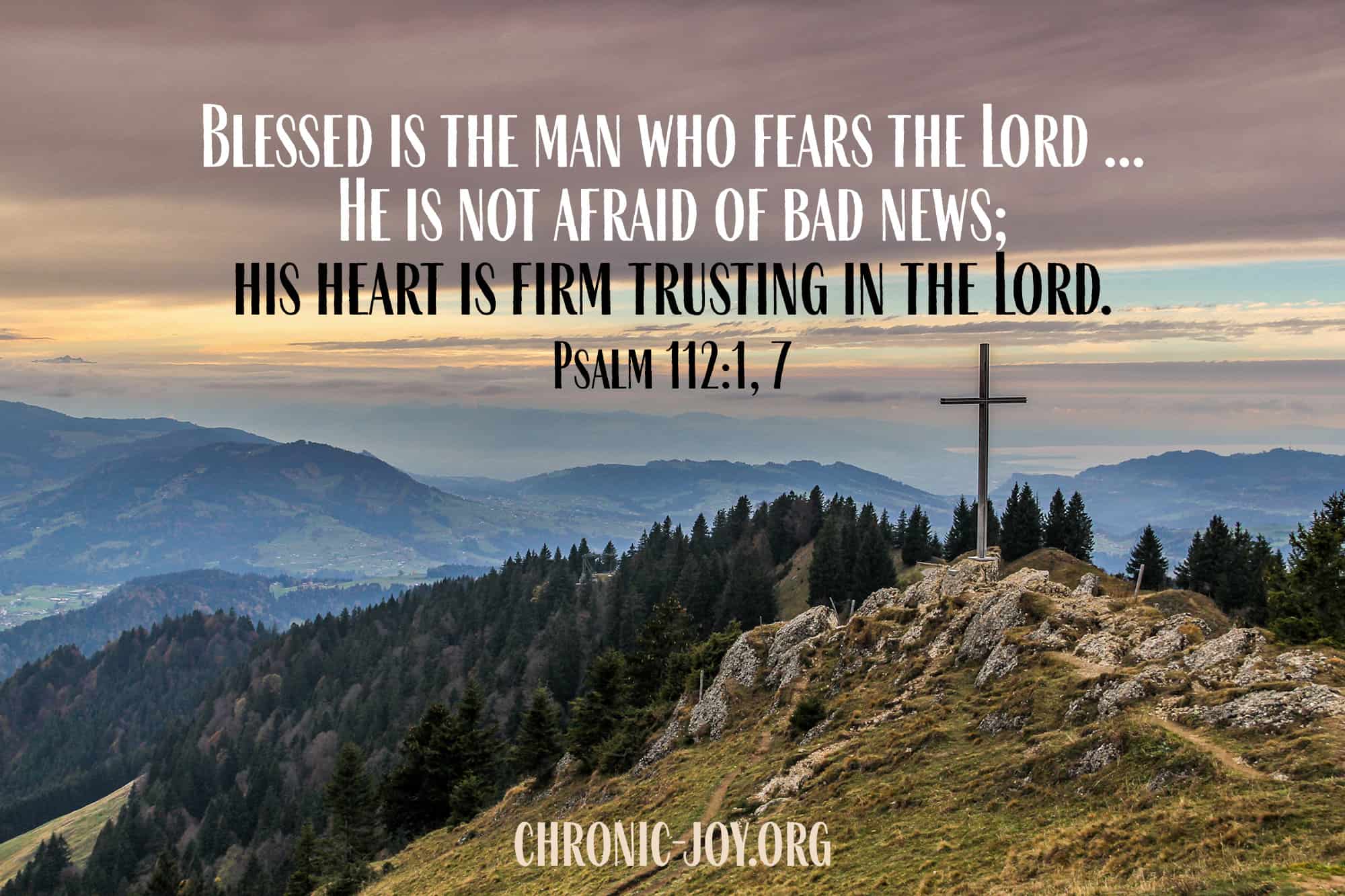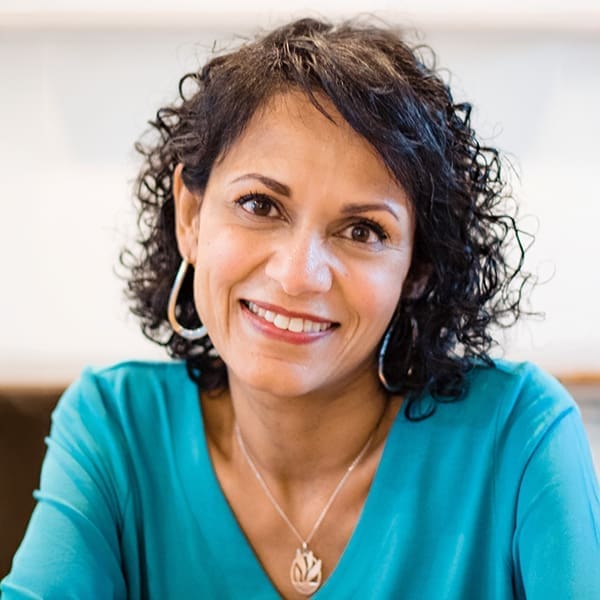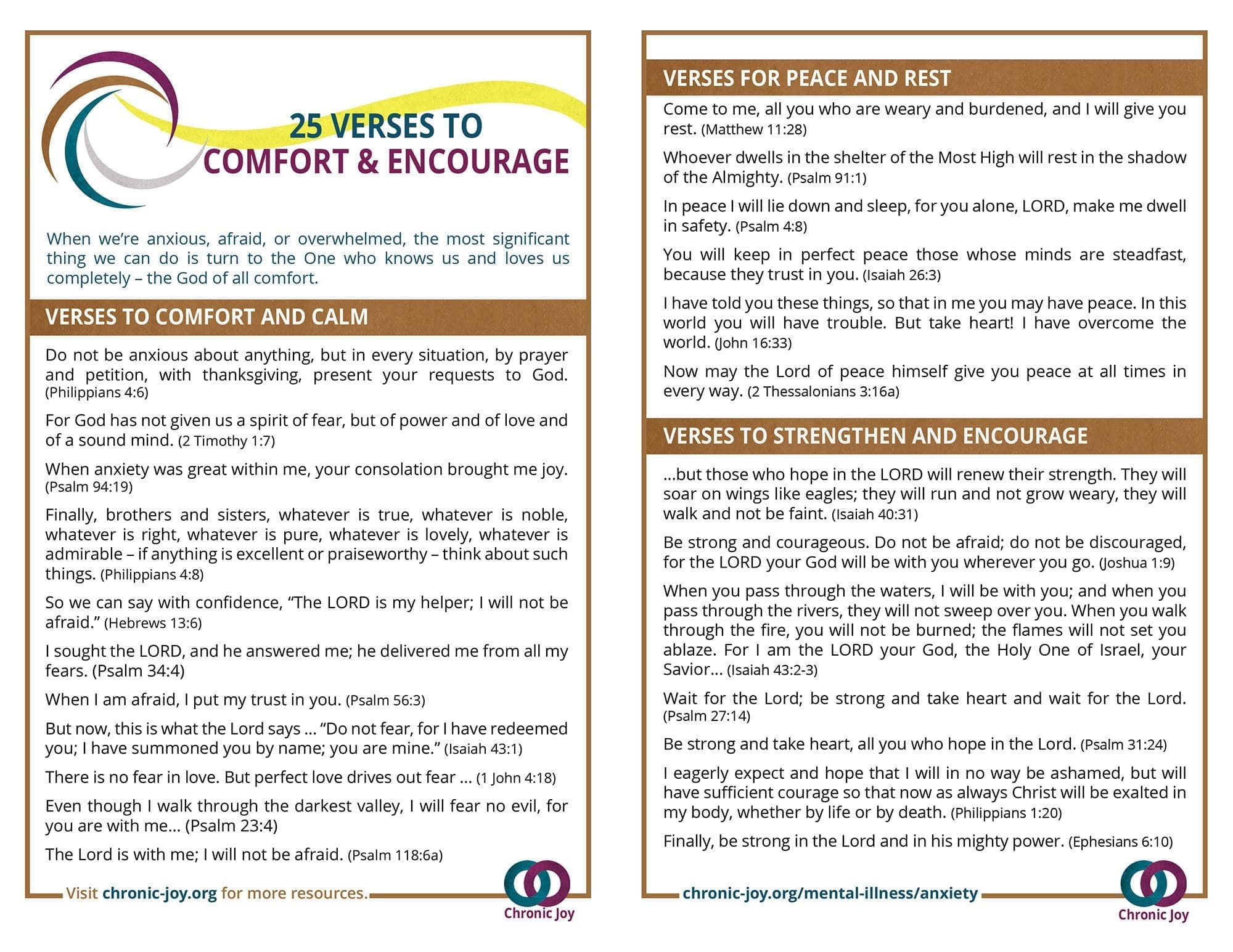
“Blessed is the man who fears the Lord … He is not afraid of bad news; his heart is firm trusting in the Lord.” Psalm 112:1, 7
FAITH BIGGER THAN FEAR
Let your faith be bigger than your fear.
That plaque sits prominently on the shelf in my office. Most of the time, I hardly notice it – but recently, that phrase has taken on new meaning.
In Psalm 112:1, 7-8a, we read: Blessed is the man who fears the Lord …. He is not afraid of bad news; his heart is firm, trusting in the Lord. His heart is steady; he will not be afraid…
He is not afraid of bad news. Those words arrested me.
That’s not where I live. I do fear bad news.
FEAR IN UNCERTAINTY OF VARIOUS SITUATIONS
Several friends are in crisis. A few are dealing with cancer. Others are in volatile situations. When I hear of an adverse new development, I fear the problem might escalate. I pray and force myself to trust, though my heart feels unsteady.
Then, there is my own less serious suffering. This week, I will have routine outpatient surgery on my right hand, which I’ve been putting off for a while. I only have use of one hand, so I’m aware that even a minor mistake could be disastrous.
I’ve been afraid in all these situations, but I’m not exactly sure of what.
As I ponder this question, I realize that most of my fear is rooted in the unknown. I am afraid of bad news because I don’t like uncertainty.
Several years ago, during a painful time in my life, I realized that the hardest part of my grief was facing the unknown.
A friend gave me an article about uncertainty that detailed how a Michigan research team studied patients who had colostomies, some of whom knew their colostomy was permanent while others had the possibility of having it reversed. Six months later, the patients who knew their difficult condition was irreversible were happier than those who were still waiting to find out if they could return to normal.
The author asks, “Why would we prefer to know the worst than to suspect it?” In other words, fearing a terrible event is worse than having it happen.
Uncertainty is what paralyzes. We can’t make plans. We don’t know how to feel. We can’t make peace with the outcome because we don’t know what it is. We must live in limbo, which can be the hardest place to rest.
Thinking about a difficult future makes me uneasy and anxious. I have never lacked anything I needed at any moment, yet I’m irrationally afraid that I won’t get what I need in the future.
This fear isn’t easy to overcome since it is not logical. It isn’t based on fact, history, or evidence. Nonetheless, it’s real. Four things came to mind as I pondered how to address it so I could be faith-filled even with the prospect of getting bad news.
First, I need to remember God’s faithfulness.
The children of Israel recited God’s faithfulness to each other when they were afraid. The Lord had parted the Red Sea, fed them manna, defeated their enemies. Just as he did for the Israelites, God has unfailingly provided for my needs – even when my life was falling apart.
Second, I need to follow my fear and see where it takes me.
I can ask myself: What is the worst thing that can happen? While the answer may seem terrifying, I know that God will be with me even in my worst nightmare. There is nowhere I can go without Him. God will be my refuge even if the earth gives way and the mountains are moved into the heart of the sea. (Psalm 46:1-2)
My fear escalates when I can’t or won’t articulate what I fear. I must verbalize my fears to remind myself that God will never fail nor forsake me.
Practically speaking, my greatest fear with my health is that I will completely lose use of my right hand, making me wholly dependent on others for everything. This could be a natural progression with post-polio, and the thought of that terrifies me. Even a small mistake in this surgery may hasten that process along. However, when I verbalize my fear, I am immediately reminded of Joni Eareckson Tada. She has no use of her hands and cannot care for her most basic needs, yet God takes care of her. She is the most joyful person I know, though she has quadriplegia and lives with chronic, debilitating pain. God has been there for her – and that same God will be there for me.
Third, I need to trust that God will give me the grace I need.
I can’t imagine that sufficient grace now because I don’t live in the future and don’t know what I’ll need.
A friend who is battling cancer recently said, “I’m not afraid of death because I know where I will go – but I am afraid of dying.” Most of us can relate to this statement; we wonder how we will face dying. Ed Welch, in his book Running Scared, insightfully offers:
Among my assorted fears and anxieties is the fear of suffocation, especially through drowning…. What does tomorrow’s manna, future grace, have to do with such fears? It does not say that I will be spared suffocation …
If I am called to drown, I don’t know what grace I will receive. Having never had it, I can’t imagine it, and since God gives much more than we ask, my prediction would no doubt fall far short. It is enough to know that I will receive grace. I will know the presence of the Spirit, and I will die (or be rescued) in a way that pleases the Lord.
God will give me the grace I need when I need it. That is what I need to trust.
Finally, I need to remember that nothing comes into my life that has not passed through God’s loving hands first.
Everything that happens to me is either permitted or caused by God – and if it comes to me, God will use it for my good and his glory. It will be best for me.
FB Meyer, a late-nineteenth-century London preacher, had this helpful analogy:
The child of God untremblingly opens each buff-colored envelope… No tidings can be evil to him; his heart is fixed, trusting in the Lord… He refuses to judge things by their appearances. He knows that all things must be working for good on his behalf: in the hieroglyphics, he detects his Father’s handwriting. (Our Daily Homily, April 29)
Even when the words are hard to interpret, we can recognize our Father’s handwriting.
With these assurances, we can be unafraid of bad news. God has always provided for our needs and will faithfully continue to provide for us in every circumstance.
Our faith can be bigger than our fear, and our hearts can be firm, trusting in the Lord, when we know that everything that comes to us is in our Father’s handwriting.
The Fear in Uncertainty first published May, 2018 at vaneetha.com. Republished with permission.


Vaneetha Risner
Author
Vaneetha writes and speaks about meeting God in suffering. She is the author of The Scars That Have Shaped Me, Walking Through Fire, and Desperate for Hope (a Bible study). You can find her writing at Desiring God and Vaneetha.com. Vaneetha lives in North Carolina with her husband, Joel. She has two daughters, Katie and Kristi.

25 Verses to Comfort and Encourage
When we’re lonely, anxious, afraid, or overwhelmed, the most significant thing we can do is turn to the one who knows us and loves us completely – the God of all comfort.

Recent Comments